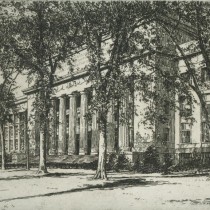Magazine

The Mystery Above the Pillars
What does the quote on the front of Angell Hall mean, and why is it there?
by Terrence J. McDonald
When I was Dean of the College of Literature, Science, and the Arts, I had a dream. In it at some point in their busy lives here, every University student, staff, and faculty member would walk down State Street to view the great quotation on the pediment of Angell Hall. Reflecting on its origins, and inspired by its sentiments, they would then proceed up the steps of Angell Hall and into the astonishing intellectual world of the University of Michigan.
But then I woke up. In my travels through the College and the University, I learned that almost no one knew there was an inscription on the pediment, and those who had noticed one often had no idea what it said or what its source was.
The inscription is a passage from the Ordinance of 1787, commonly known as the Northwest Ordinance, drafted originally by Thomas Jefferson and passed by the Continental Congress in that year. The Ordinance organized the Northwest Territory—that great stretch of land “northwest” of the original 13 American colonies—that would become the states of Michigan, Ohio, Illinois, Indiana, and Wisconsin.
The inscription says: Religion, morality, and knowledge, being necessary to good government and the happiness of mankind, schools and the means of education shall forever be encouraged. Along with the sentiment came grants of land to be sold to fund the “means of education,” thus making real the first promise of free, universal public education in the history of the world. And in 1804, the United States Congress declared, based on this previous ordinance, that one township of land (23,040 acres) in each of the Northwest States would be sold to support higher education. To this, the Native American tribes of Michigan added three more sections (1,920 acres) in the Treaty of Fort Meigs in 1817.
This passage from the Northwest Ordinance was, therefore, the birth certificate of the University of Michigan. In 1887, the famous inscription was installed in the auditorium of University Hall, the headquarters of what was then called the Literary College, later the College of Literature, Science, and the Arts. The auditorium was the celebratory heart of the University, the place where all large gatherings and meetings were held as well as lectures, dramatic and musical presentations (some of the most famous orators of the 19th century spoke there). For years, the ordinance was what all students and all visitors saw every time they entered the auditorium.
In 1925, the Hall was condemned and scheduled for demolition, and Hill Auditorium eventually would replace it as the ceremonial heart of the campus. In 1921, the Regents authorized a new “Literary Building” to replace University Hall itself. This would become James B. Angell Hall.
When the first designs for Angell Hall were prepared in 1923, they showed the building much as it is now, with the famous phrase beautifully inscribed where it is today. However, to save money, the Regents asked the building’s famed architect, Albert Kahn, to build Angell Hall directly to the west of University Hall, leaving the latter open for use (which continued, amazingly, through World War II). This compromised the site lines for the inscription from State Street. Both that decision and the inevitable effect of time on the letters make for hard reading today. It is only in the right light and with a craned neck that one can make it out.
But it is worth the effort to read the inscription to feel the inspiration it provided to the leadership of the Michigan territory who believed so firmly and at a time so long ago that a public university was necessary for the kind of society they hoped to build. It still is.

